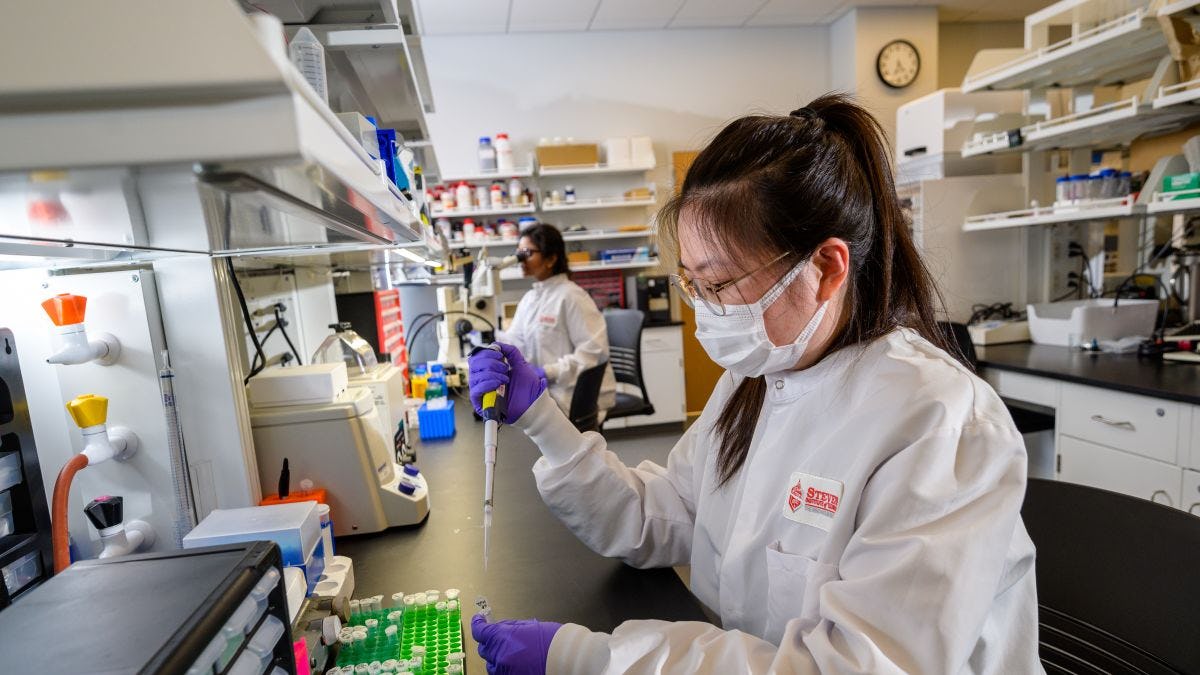
Bachelor's Degree in Biomedical Engineering
Learn to apply design and analysis techniques as you engineer solutions to problems at the interface between physical and biological systems in the biomedical engineering bachelor’s program.
Biomedical engineers design medical devices and instruments that improve patient quality of life and help doctors diagnose and treat diseases, like artificial hearts, pacemakers and defibrillators, imaging devices, prosthetic limbs, and more.
In the biomedical engineering program at Stevens, you’ll learn the fundamentals of math, science, engineering, biology, physiology and the interactions of engineering materials with biological surfaces.
Our program’s design-based curriculum includes a capstone senior design project where you’ll work with a team to design, build and test a real medical device. You'll also get extensive laboratory experience working alongside faculty on cutting-edge biomedical engineering research in areas like biorobotics, brain-machine interface, spinal implants, lung mechanics, emergency medicine (with Hoboken University Medical Center), and tissue engineering.
Concentrations
Biomaterials and Tissue Engineering
Biomechanical Rehabilitation
Neuroengineering and Biomedical Imaging
The Stevens Advantage: Hands-On Learning, Real World Experience
At Stevens, you’ll learn to think like an engineer. Our design-focused curriculum features a hands-on course every semester that will instill you with broad, foundational knowledge, the complete fundamentals of engineering, and entrepreneurial thinking. Learn more about what makes an engineering education from Stevens a unique experience:
The Design Spine: a unique, design-focused, hands-on course every semester that incorporates entrepreneurial thinking and experiential learning, culminating with Senior Design, a team capstone project working on prototypes for real business problems, potentially in collaboration with a real company
Innovation Expo: an exciting design and entrepreneurship competition where students showcase their senior design prototypes and pitch business ideas
Engineering Cooperative Education Program: nearly 30% of all engineering students participate in Stevens’ Cooperative Education Program where you get on-the-job experience working for real companies
State-of-the-Art Research Labs and Facilities: build, tinker and test your designs in Stevens' MakerCenter, Prototype and Object Fabrication Lab, or numerous other research facilities
Undergraduate Research Opportunities: our research-oriented curriculum gives you in-the-lab experience while you're still an undergraduate student
Hands-On Biomedical Research
At Stevens, you have the ability to join research groups with students at a variety of levels of experience, and outstanding faculty so you can learn cutting-edge technology as a team, just like in the real-world. In our state-of-the-art research labs and facilities, you'll have the opportunity to engage in experiential learning in the following areas:
Biomaterials
Biomedical Imaging
Biomechanics and Rehabilitation
Neural Engineering
Tissue Engineering
Drug Delivery
Medical Devices and Instrumentation
Lung Mechanics
Translational Biomedical Engineering
More opportunities for Stevens undergraduate students include:
Double count undergraduate course credits toward a graduate degree and earn your master's faster – in just five years through Stevens' Accelerated Master's Program >
See what it's like to be a biomedical engineer at Stevens by visiting the links below.
An ABET Accredited Program
The Bachelor of Engineering in Biomedical Engineering program is accredited by the Engineering Accreditation Commission of ABET, https://www.abet.org, under the commission’s General Criteria and the Program Criteria for Bioengineering and Biomedical and Similarly Named Engineering Programs.
Mission
The biomedical engineering program produces graduates who possess a broad foundation in engineering and liberal arts, combined with a depth of disciplinary knowledge at the interface of engineering and biology. This knowledge is mandatory for success in a biomedical engineering career. Biomedical engineering is also an enabling step for a career in medicine, dentistry, business, or law.
Program Educational Objectives
The objectives of the biomedical engineering program are to prepare students such that, within several years after graduation:
Graduates will identify biomedical engineering challenges and lead solution concepts
Graduates will be able to nurture concepts to commercialization by applying their knowledge of fundamental engineering principles, work experience, and state-of-the-art tools and techniques
Graduates will be among the leaders of the fields in the development of biomedical devices, implants, tissues, and systems to meet the needs of society
Graduates will establish themselves as leaders in their chosen career path by applying their skills in problem solving, teamwork, ethics, management, communication, and their awareness of professional and social issues
To accomplish this, the undergraduate program provides a balanced education in fundamental principles, design methodologies, and practical experiences in biomedical engineering, general engineering, and physical and mathematical sciences topics through which graduates can enter and sustain lifelong professional careers of engineering innovation and creativity.
Graduates of the biomedical engineering program will:
Be recognized as innovative technical experts who demonstrate advanced understandings of the state-of-the-art in biomedical engineering, as well as their professional, social, and ethical responsibilities
Emerge as technical leaders through their own individual contributions and their abilities to work with and influence others
Function as effective entrepreneurs who nurture innovative technologies from concept to commercialization
Student Outcomes
By the time of graduation, biomedical engineering students will have:
An ability to identify, formulate, and solve complex engineering problems by applying principles of engineering, science, and mathematics
An ability to apply engineering design to produce solutions that meet specified needs with consideration of public health, safety, and welfare, as well as global, cultural, social, environmental, and economic factors
An ability to communicate effectively with a range of audiences
An ability to recognize ethical and professional responsibilities in engineering situations and make informed judgments, which must consider the impact of engineering solutions in global, economic, environmental, and societal contexts
An ability to function effectively on a team whose members together provide leadership, create a collaborative and inclusive environment, establish goals, plan tasks, and meet objectives
An ability to develop and conduct appropriate experimentation, analyze and interpret data, and use engineering judgment to draw conclusions
An ability to acquire and apply new knowledge as needed, using appropriate learning strategies
A fundamental knowledge and an appreciation of the technology and business processes necessary to nurture new technologies from concept to commercialization
Putting You on Track for Professional Success
The biomedical engineering bachelor’s program develops in-demand knowledge and skills to put you on track for career success in the biotech industry, to enter medical school, or to continue your education in graduate or professional school. Career opportunities include:
Biomedical Engineer
Product Development Engineer
Clinical Engineer
Research Scientist
Quality Engineer
Medical Technology Developer
Potential hiring organizations include companies like: Becton Dickson (BD), Deloitte, Flowonix Medical, GE Healthcare, Johnson & Johnson, Stryker Orthopedics, Zimmer Biomet, Integra Life Sciences, MTF Biologics and more
A Tech Forward Education
Undergraduate Programs Facts & Statistics
Related Programs
Bachelor's Degree in Biology
The biology bachelor’s program develops in-demand knowledge and skills to put you on track for career success, whether it's graduate, medical, dental, veterinary, physician’s assistant, or physical therapy programs.
Bachelor's Degree in Chemistry
Research with some of industry’s brightest minds as you prepare for a career in one of the most applicable fields of science.
Bachelor’s Degree in Chemical Engineering
Become one of tomorrow’s technological leaders in industrial chemical processes with a chemical engineering bachelor’s degree from Stevens.







